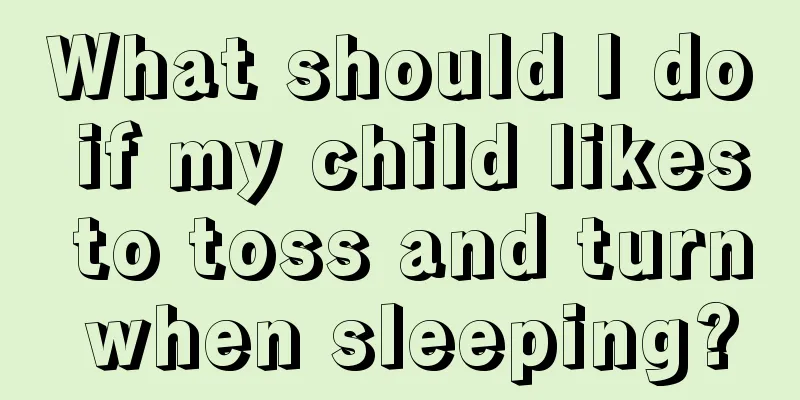Children with nocturnal urination and frequent bedwetting

|
Some parents always feel that their children urinate frequently at night and are very prone to bedwetting. This happens even if they do not drink much water at night. At this time, they should take their children to the hospital for a detailed examination to determine the real reason for their children's problem. It is usually related to poor work and rest habits, and only a very small number of children have physiological reasons. 1. General treatment Develop a good work and rest system and hygiene habits, avoid overwork, control the time and regularity of bedwetting, and use an alarm clock to wake up the child to urinate 1 to 2 times at night. Sleep 1 to 2 hours during the day, avoid excessive excitement or strenuous exercise during the day to prevent deep sleep at night. Build confidence throughout the treatment process. Gradually correcting emotions or behaviors such as shyness, anxiety, fear and timidity, taking care of the patient's self-esteem, giving more comfort and encouragement, less scolding and punishment, and reducing their psychological burden are the keys to successful treatment. It is necessary to correctly deal with the mental factors that cause enuresis, understand the mental triggers and possible psychological conflicts that lead to enuresis through medical history, and resolve the mental stimulation factors that can be resolved as soon as possible. For contradictions and problems that have already occurred or exist objectively in reality and cannot be resolved subjectively, we should focus on patiently educating and explaining to the children in order to eliminate mental tension and avoid emotional distress. Avoid drinking water after dinner and empty your bladder before going to bed to reduce the frequency of bedwetting. 2. Behavioral therapy for bedwetting in children (1) Urination interruption training: Encourage your child to interrupt urination in the middle of each urination, count from 1 to 10, and then urinate completely. This can train and improve the bladder sphincter's ability to control urination. (2) Urine retention training: Let your child drink plenty of water during the day. When he feels the urge to urinate, let him hold his urine for no more than 10 minutes each time. Do this training 1 to 2 times a day to expand the bladder and increase its capacity, thereby reducing the number of urinations at night. (3) Timed training: Use an alarm clock to wake up the child half an hour before the time when the child usually wets the bed at night. Let the child walk back and forth in the room or wash his face with cold water so that he can urinate while being conscious. This is also to help establish a conditioned reflex. Parents should promptly detect bedwetting in their children and urge them to empty any remaining urine, wipe the area dry, change their underwear and dry the bed. 3. Medication (1) Imipramine is suitable for arousal disorder type. (2) Oxybutynin, also known as Urodol, is suitable for frequent urination during the day and at night. (3) Ephedrine can be used in mixed form. (4) Desmopressin is a synthetic antidiuretic hormone, also known as desmopressin, which is suitable for nocturnal polyuria. The combination of amitriptyline, desmopressin, and oxybutynin is currently considered an effective triple drug for the treatment of refractory mixed enuresis. The advantage is that the efficacy is close to that of the SNM therapy described below, but the disadvantage is that there are side effects of varying degrees and the disease is prone to relapse after discontinuation of the drug. The above drugs are prescription drugs. Imipramine and amitriptyline are antidepressants. The dosage shown is for adults. Children should calculate it per kilogram of body weight. |
<<: Symptoms of early stage purpura in children
>>: Where is the best place to get moxibustion for children who are bedwetting?
Recommend
Be alert to the three major signs of neurasthenia in children!
Not only adults will have symptoms of neurastheni...
How to treat children's sore throat and recurrent fever?
Due to seasonal changes or excessive heat in the ...
How often is it normal for a baby to poop?
The baby's physical condition is something th...
What are the benefits of eating kiwi fruit for children?
Nowadays, children like to eat fruits. Fruits are...
Children have only one testicle
Normal babies have two testicles and they are sym...
How to treat jaundice in a 50-day-old baby
How to treat jaundice in a 50-day-old baby? If th...
What to do if baby's hands and feet are peeling
Do mothers who take care of children all have a p...
How to treat herpetic pharyngitis in infants
Among children's diseases, infantile herpetic...
Prevention and care of infant tongue ulcers
The oral cavity of a newborn baby is relatively f...
How long does it take for jaundice to subside?
If the baby has physiological jaundice, the jaund...
What should I do if my child has a fever of 45 degrees?
Fever is a common condition for everyone. Fever i...
Babies always cry, have mothers ever thought about these reasons?
Many people think that children's crying is i...
What to do if there are white spots on the child's fingertips
The doctor said that the reason why children have...
Is it normal for a child's head to sweat a lot?
Children must be busy jumping around every day. O...
What should I do if my child wants to grow taller?
It is a relatively normal phenomenon for children...









